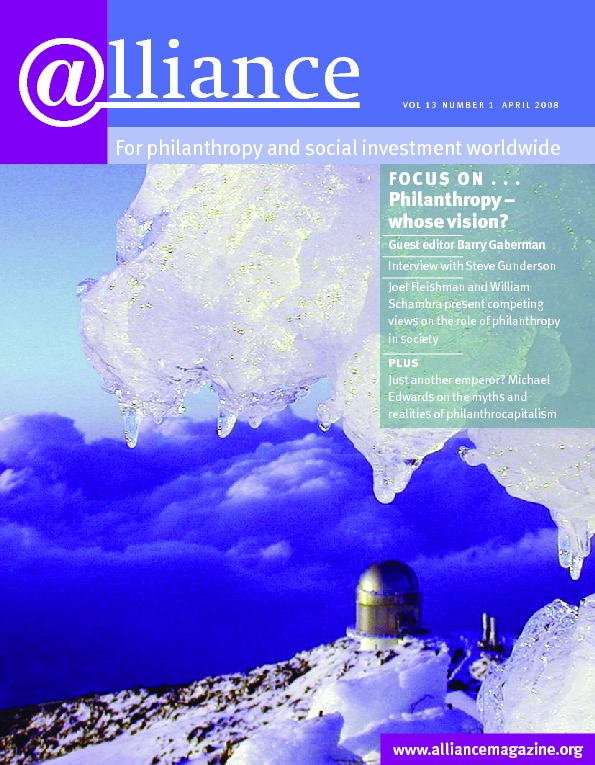Over the last 12 months, the inbox of my computer – like yours, I suspect – has been deluged with news from conferences, speeches, newspaper articles and reports that promise to ‘save the world’ by revolutionizing philanthropy, making non-profit organizations operate like businesses, and creating new markets for goods and services that benefit society.
The supporters of this approach, nicknamed ‘philanthrocapitalism’ for short, believe that business principles can be successfully combined with the search for social transformation. There’s no doubt that this is an important phenomenon. Very large sums of money have been generated for philanthropy, particularly in the finance and IT industries.
Despite its great potential, this movement is flawed in both its proposed means and its promised ends. It sees business methods as the answer to social problems, but offers little rigorous evidence or analysis to support this claim, and ignores strong evidence pointing in the opposite direction. Business will continue to be an inescapable part of the solution to global problems, and some methods drawn from business certainly have much to offer. But business will also be a cause of social problems. As Jim Collins, author of Good to Great, concluded in a recent book, ‘we must reject the idea – well-intentioned, but dead wrong – that the primary path to greatness in the social sectors is to become more like a business.’[1]
Philanthrocapitalism’s other promise is to achieve far-reaching transformation by resolving entrenched social problems, yet its lack of understanding of how change occurs guarantees that this promise is unlikely to be achieved. There’s a huge gulf between the hype surrounding this new philanthropy and its potential impact. Some of the newer philanthropists have come to recognize this – and shown both humility and a readiness to learn about the complexities of social change – but too many remain captivated by the hype. Philanthrocapitalism has seized on an important part of the puzzle of how to square democracy with the market, but is in danger of passing itself off as the whole solution, downgrading the costs and trade-offs of extending business and market principles into social transformation. I argue that:
- The hype surrounding philanthrocapitalism runs far ahead of its ability to deliver real results. It’s time for more humility.
- The increasing concentration of wealth and power among philanthrocapitalists is unhealthy for democracy. It’s time for more accountability.
- The use of business and market thinking can damage civil society, which is the crucible of democratic politics and social transformation. It’s time to differentiate the two and reassert the independence of global citizen action.
- Philanthrocapitalism is a symptom of a disordered and profoundly unequal world. It hasn’t yet demonstrated that it provides the cure.
There’s justifiable excitement about the possibilities for progress in global health, agriculture and access to microcredit among the poor, stimulated by huge investments from the Gates Foundation, the Clinton Global Initiative and others. New loans, seeds and vaccines are certainly important, but there’s no vaccine against the racism that denies land to dalits (or so-called ‘untouchables’) in India, no technology that can deliver the public health infrastructure required to combat HIV, and no market that can reorder the dysfunctional relationships between different religions and other social groups that underpin increasing violence and insecurity.
Attacking the symptoms, not the cause
Philanthrocapitalism may claim to attack the ‘greatest inequities’ in society, but those are caused by the nature of our economic system and the inability of politics to change it. Disparities in health and education are symptoms of those problems, and they will reappear elsewhere if the causes go unresolved. Philanthrocapitalism fails to recognize this basic lesson of history, and is in danger of disguising the true nature of the tasks we face. Only the most visionary of the philanthrocapitalists have much incentive to transform a system from which they have benefited hugely.
Would philanthrocapitalism have helped to finance the civil rights movement in the USA? I hope so, but it wasn’t ‘data-driven’, it didn’t operate through competition, it couldn’t generate much revenue, and it didn’t measure its impact in terms of the numbers of people who were served each day. Yet it changed the world forever.
Is philanthrocapitalism important? Certainly yes, though it may prove more fleeting than its proponents often claim. Will it achieve its own stated objectives? Almost certainly not, though some good will undoubtedly get done along the way. Will it advance the efforts of others to lever deeper changes in society? Not unless it decides to change direction, and learns to accept that there are costs and contradictions in mixing business with social objectives.
Time for a new kind of debate
If the foundations of this movement are so weak, why not let it burn itself out like so many fashions before? Isn’t it ‘just another emperor with no clothes’, waiting for some brave or foolish soul to acknowledge its nakedness in public? I think this would be a serious mistake, because we can’t bypass what I call the ‘55 trillion-dollar question’ – the amount of philanthropic resources estimated to be created in the United States alone in the next 40 years. Will we use these vast resources to pursue social transformation, or just fritter them away by spending on the symptoms? If they ignore this question, the philanthrocapitalists may find themselves on the receiving end of the same kind of backlash that greeted previous concentrations of private wealth and power.
So, what to do? I think it’s time for a different kind of conversation, less dominated by hype and more open to different and dissenting voices. The outcome will be messy and uncomfortable for some, that’s for sure, but it will be more democratic, and much more effective in nurturing bold new approaches to social and economic change. Civil society should participate in this debate as a full and independent equal, proud of its traditions, self-confident about its achievements, and unafraid to reject or criticize business models that are inappropriate for its purpose. The result could indeed be a world transformed.
1 Jim Collins (2006) Good to Great and the Social Sectors Century.
Michael Edwards has authored numerous books and articles on the global role of civil society. At publication of this article he is Director of Governance and Civil Society at the Ford Foundation, but he writes here entirely in a personal capacity and wants to thank the Ford Foundation for allowing him to be away on sabbatical in 2007 when he wrote this piece. The views expressed in this article should not be taken to represent the opinions or policies of the Ford Foundation. Email edwarmi@hotmail.com
To order or download
Michael Edwards’ new pamphlet Just Another Emperor? The myths and realities of philanthrocapitalism is available from Amazon or for free download from the following websites: http://www.demos.org http://www.youngfoundation.org http://www.justanotheremperor.org






Comments (0)